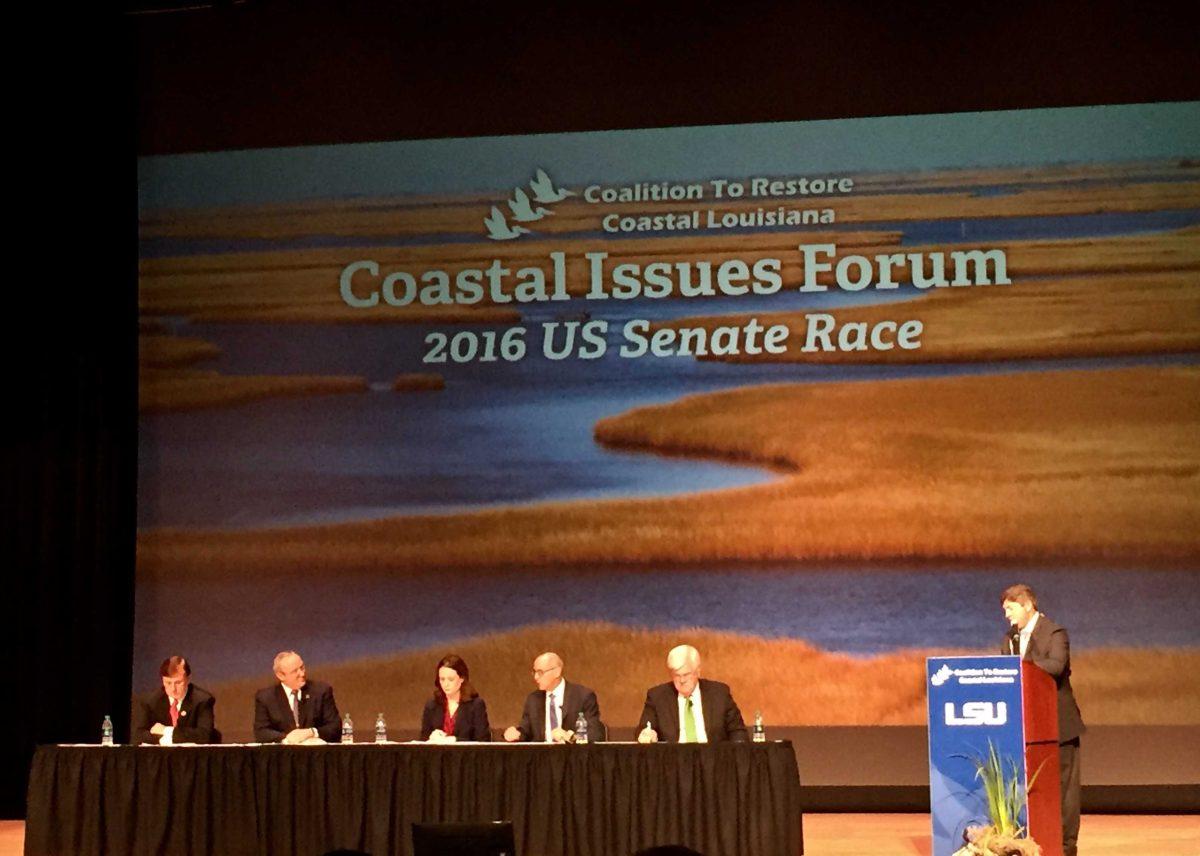Five of the leading candidates for Sen. David Vitter’s opening in the U.S. Senate met onstage at the LSU Union Theatre to talk coastal restoration.
The forum was hosted by the Coalition to Restore Coastal Louisiana and the Louisiana Wildlife Federation. The top six polling candidates based off the average of four polls taken before Aug. 31 poll were invited to participate. Public Service Commissioner Foster Campbell and New Orleans lawyer Caroline Fayard, Democrats, joined Republicans Rep. Charles Boustany, retired Col. Robert Maness and Rep. John Fleming were present at the forum. State Treasurer John Kennedy, a Republican, declined to participate.
CRCL communications director Jimmy Frederick moderated the debate after LSU President F. King Alexander, CRCL Executive Director Kimberly Reyher and Republican Rep. Garret Graves made opening remarks. The candidates were given one minute and 15 seconds to respond to each of the seven questions.
Candidates gave input on issues such as where to gather more revenue for Louisiana’s coastal master plan, making flood insurance more affordable, the state’s relationship with federal agencies, climate change and loan forgiveness.
Louisiana has $12-15 billion of funding streams due to the RESTORE Act and phase two of GOMESA measure being passed later this year to invest in a coastal master plan. Candidates responded as to how they would secure the tens of billions of dollars still needed for the plan. Several candidates harped on the importance of legislative and executive offices not diverting designated state funds for other purposes.
“We have to continue to educate our fellow countrymen about how important the Mississippi River delta is,” Fayard said.
Fayard said having respect for who is in the White House is key to a working relationship with all government agencies, which is necessary in order to push state issues with a sense of urgency. By building coalitions with influential parties and educating people on the impact the loss of Louisiana’s coast would make nationally, the can make strides to restore its land, she said.
Maness alluded to the importance of implementing a “coastal impact bank,” which Graves introduced in the legislature in May as part of the Water Resources Development Act. With the bank, Fleming said he thought oil and gas companies should assist in state funding due to their vested interest.
Campbell emphasized his role in standing up to “those in Washington” and his experience working with bi-partisan officials and federal agencies, such as the US Army Corps of Engineers.
“I will watch them like a hawk and I will not let them forget what they have to do to help us in Louisiana from coastal erosion,” he said.
In reference to the Deepwater Horizon oil spill, Fayard said litigation is costly and time-consuming, and the state should focus more on factors it can control, like working to build coalitions and keeping money in the state.
“We’re not going to litigate our coast back into existence,” Boustany said.
Promoting the state’s sense of urgency in coastal erosion and keeping allotted dollars in place are the main challenges in the effort for coastal restoration, while maintaining the status as an oil and gas industry giant, the majority of candidates agreed on.
The candidates also spoke on the necessity of more homeowners having flood insurance, and how to make it more affordable. Harnessing the power of the Mississippi River to build land through diversion projects was also a topic of focus.
Democratic candidates Campbell and Fayard both acknowledged the existence of climate change, Campbell saying it is man-made. Maness spoke on the importance of sea levels rather than climate change, while Fleming answered that lowering carbon emissions is key to cleaner air and water. Boustany said he believes that peer-reviewed science should drive decision making, and cutting through bureaucracy is how good economic policy will coincide with good environmental policy.
At the conclusion of the forum, Maness announced his intentions to make his tax returns public, and challenged his opponents to do the same while pledging his support to Donald Trump. Campbell made three years of his tax returns public on Sept. 22.








